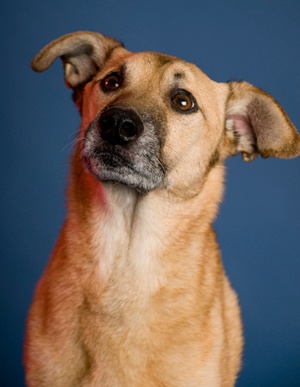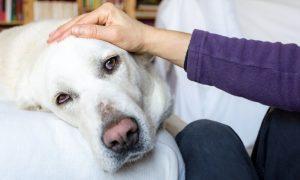“This post contains affiliate links, and I will be compensated if you make a purchase after clicking on my links.”
Bloat is a very serious health risk for many dogs, yet many dog owners know very little about it. In fact, it is one of the leading causes of death in dogs and, if not treated, this medical emergency kill in less than an hour. The ASPCA has written this description of bloat, or gastric dilation-volvulus (GDV). If you are a pet owner, you should know the signs of bloat and know what to do if it occurs.
Know the Signs: What Is Bloat?
When bloat occurs, the dog’s stomach fills with air, fluid and/or food. The enlarged stomach puts pressure on other organs, can cause difficulty breathing, and eventually may decrease blood supply to a dog’s vital organs.
People often use the word “bloat” to refer to a life-threatening condition that requires immediate veterinary care known as gastric dilatation-volvulus (GDV), gastric torsion and twisted stomach. This condition can cause rapid clinical signs and death in several hours. Even with immediate treatment, approximately 25% to 40% of dogs die from this medical emergency.What Are the General Symptoms of Bloat/GDV in Dogs?
- Distended abdomen
- Unsuccessful attempts to belch or vomit
- Retching without producing anything
- Weakness
- Excessive salivation
- Shortness of breath
- Cold body temperature
- Pale gums
- Rapid heartbeat
- Collapse
What Causes Bloat in Dogs?
The exact cause is currently unknown. Certain risk factors include: rapid eating, eating one large meal daily, dry food-only diet, overeating, overdrinking, heavy exercise after eating, fearful temperament, stress, trauma and abnormal gastric motility or hormone secretion.
What Causes GDV in Dogs?
The exact cause is currently unknown.
What Should I Do If I Think My Dog Has Bloat?
Bring your dog to a veterinarian immediately. Timeliness of treatment is paramount, since a dog exhibiting signs of bloat may actually have GDV, which is fatal if not promptly treated.
How Is Bloat Treated?
Depending on your dog’s condition, a veterinarian may take an X-ray of the abdomen to assess the stomach’s position. The vet may try to decompress the stomach and relieve gas and fluid pressure by inserting a tube down the esophagus.
How Is GDV Treated?
If the stomach has rotated, emergency surgery is necessary to correct torsion. There are many complications that can occur both during and after surgery, including heart damage, infection and shock; intensive post-operative monitoring for several days is routine. Most vets will recommend that during this surgery, the dog’s stomach be permanently attached to the side of the abdominal cavity in order to prevent future episodes.
Are Certain Breeds Prone to Bloat/GDV?
Most dogs love to overeat if given the opportunity, so any dog, from a Greyhound to a Chihuahua, can get bloat.
However, it is very rare for dogs that are not large, deep-chested breeds to be struck with GDV. This condition most often afflicts those dogs whose chests present a higher depth-to-width ratio. In other words, their chests are long (from backbone to sternum) rather than wide. Such breeds include Saint Bernards, Akitas, Irish Setters, Boxers, Basset Hounds, Great Danes, Weimaraners and German Shepherds.
How Can I Prevent Bloat/GDV?
- Feed your dog several small meals, rather than one or two larger ones, throughout the day to avoid eating too much or too fast.
- If appropriate (check with your vet), include canned food in your dog’s diet.
- Maintain your dog’s appropriate weight.
- Avoid feeding your dog from a raised bowl unless advised to do so by your vet.
- Encourage normal water consumption.
- Limit rigorous exercise before and after meals.
- Consider a prophylactic gastropexy surgery (which fixes the stomach in place, as described above) if you have a high-risk breed.
The dog who is pictured with this article, Virgil, lost his life to bloat at age 12. Within half an hour of the initial symptoms of unsuccessfully attempting to vomit, his stomach had filled with air and he was over twice as wide as normal and in extreme pain. Fortunately, I knew the signs and rushed him to the emergency room, but sadly he wasn’t healthy enough to undergo surgery and had to be put down. You can find the original text from the SPCA here. Know the signs of bloat and know in advance what you would do if this happened to your dog. Do you have any experience with bloat? Share your story in the comment box below.
















Mary
Nov 19, 2014 at 12:49 am
It still makes me sick that Hattie died last year at White’s Animal Hospital in Santa Barbara. I volunteered to walk her everyday as she was being boarded there by one of our local rescues. They spayed her and apparently gave her too much food. She must have suffered that night all alone. One of the techs there told me “it’s happened before.”
Deb
Nov 18, 2014 at 7:13 pm
My standard poodle received emergency surgery on Xmas Eve a few years ago and was saved. It was scary because he was acting funny and we knew something was wrong. Luckily the vets office is 10 minutes away and we got there quick enough!